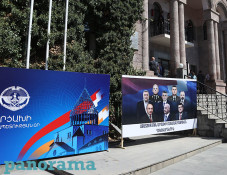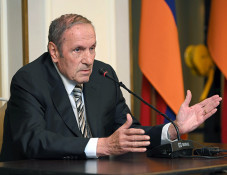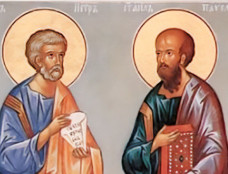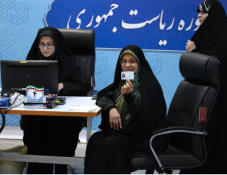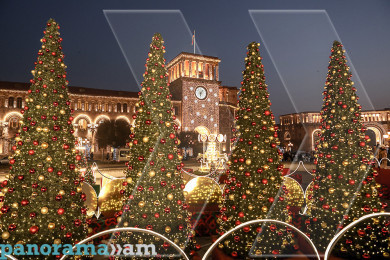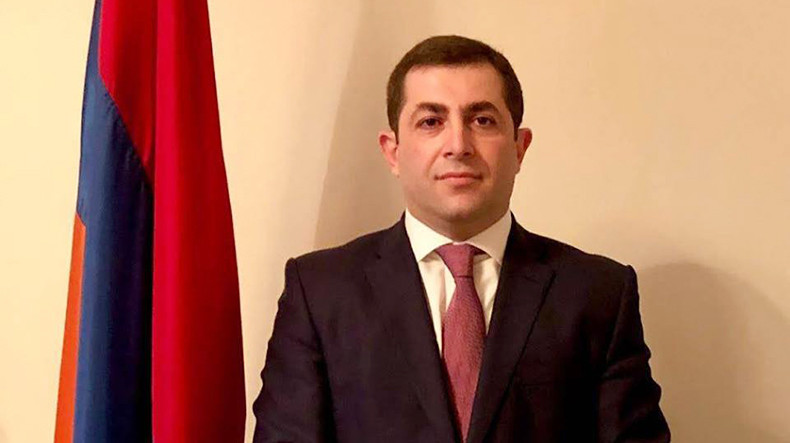
Armenia’s Ambassador to UN: The candidature of the Armenia has been presented for the Human Rights Council and the UN Security Council
Panorama.am’s exclusive interview with the Armenia's Permanent Representative to the UN
- Mr. Ambassador, in recent years, multilateralism has been in decline, which has become more apparent after President Trump's election. How does the United Nations function in such conditions when decisions on key issues are made by a few world leaders?
M. Margaryan - Multilateralism or the multilateral international cooperation lies at the core of the UN and is reflected in the UN Charter, the first article of which calls for the development of friendly relations among nations and to achieve international cooperation in solving international problems of an economic, social, or humanitarian character, as well as to encourage respect for human rights and for fundamental freedoms. The United Nations, as the most representative and inclusive organisation, is faced with a variety of global challenges ranging from climate change to counterterrorism.
It may be the case that recently, we have witnessed situations when some countries approach multilateralism with certain reservations, mainly due to their domestic political approaches, whether related to migration, or climate change or other pressing international issues. Here there are of course real concerns for example, in the case of migration, related to the uncontrolled flow of people and the need to have it regulated, but also there are prejudices stemming from domestic political agendas. The United Nations is the sole international platform that emphasizes and epitomizes the importance of multilateralism on a daily bases providing equal opportunity for engagement to all countries.
The adoption of most important decisions within the UN, as a rule, is preceded by broad consultations and negotiations involving all interested countries and, naturally, within that process, (which depending on the topic and scope, may take months) the Member States are working to incorporate relevant wording reflecting their national priorities, which at the same time should not contradict the priorities of other countries. It is here that multilateralism provides with opportunity to arrive at joint decisions through mutual compromises and flexibility either in the form of conventions, declarations, or resolutions, that is acceptable for the entire international community.
- Judging by the appearance in the news and social media, the Armenian Mission to the UN is quite active, statements, various meetings, what are the priorities for the New Year?
M. Margaryan - The Permanent Mission of Armenia to the UN has consistently been actively participating in the works of UN bodies and platforms so as to present Armenia's approaches and priorities in different thematic areas. With statements on various issues and the organization of thematic events, we try to make Armenia's position, as well as the developments inside Armenia more visible and comprehensible for the broader international community, focusing particularly on the protection of human rights, and the prevention of crimes against humanity, issues related to international cooperation for sustainable development, advancement of women and youth, and the innovation agenda.
One of the memorable events for Armenia within the framework of the UN in the past year was Prime Minister Pashinyan's participation in the high-level segment of the 73rd session of the UN General Assembly, the meeting with the UN Secretary General, in the high level side events such as Nelson Mandela Peace Summit, joining as a key note speaker at the panel on "Leaving No One Behind In An Age of Technological Revolution" organized by the United Nations Development Program. By the way, it was during the visit that the UN Secretary-General in his Facebook interview as well as in his report to the General Assembly mentioned the democratic developments in Armenia as a fantastic example highlighting the role of women and youth in the peaceful political changes taking place in the country. During the Prime Minister’s visit, the opening of the exhibition dedicated to Armenian medieval art held at the New York Metropolitan Museum also took place.
We start the year with membership in the UN Economic and Social Council. In June 2018 at the 72nd session of the UN General Assembly Armenia was elected a member of ECOSOC for a three-year term. This UN body, which has a membership of 54 countries, coordinates the work of UN specialized agencies, functional commissions, programs and funds and regional committees in economic, social, environmental and other related fields. The Economic and Social Council is a central platform for the relevant consultations among the Member States and the United Nations system for discussion and elaboration of international economic and social issues.
As of 2019, we joined the UN Women's Commission on the Status of Women for a four-year term. It is the only intergovernmental body with the agenda of developing international policy in the field women's rights, equality and promotion of women.
We have launched the campaign for the election to the UN Human Rights Council, which is quite competitive. In the first half of the year, Armenia will also act as a facilitator of the draft resolution on the “Cooperation between International Organization of la Francophonie and the United Nations” to be adopted by the General Assembly.
- Mr. Ambassador, recently the Minister of Foreign Affairs of the Republic of Armenia announced that Armenia wants to become a member of the UN Human Rights Council as well as the UN Security Council. How does this process take place, what are the terms of the membership, and what is the likelihood of getting elected?
M. Margaryan - The elections to Human Rights Council are scheduled for October 2019 for the period of 2020-2022. For the purposes of elections in UN bodies, in accordance with the established practice certain amount of seats are allocated to the five UN regional groups. Armenia is included in the Eastern European regional group and for that elections two vacant seats are allocated to the group and there are three candidacies. In its election campaign for the accession to the HRC Armenia will focus on democratic achievements as a result of the velvet revolution with an emphasis to the promotion of human rights and fundamental freedoms, the rule of law, fight against corruption, prevention of atrocity crimes and strengthening these areas within domestic and international frameworks.
The dramatic increase of Armenia’s democratic credentials amongst the international community provides the foundation upon which we envisage to build our election campaign. Armenia’s candidature to the UN Security Council is presented for the term 2032-2033 at the elections to be held in 2031. Taking into account the requirement of positive vote of the two-thirds the membership, (which depending on the number of present and voting members can be around 123-128 votes) the election campaign will be rather intense with the mobilization of significant resources and capacities. The term seems to be far, but for comparison consider that there are already a number of countries who have presented their candidatures for the terms up until 2045.
- The attention of the public on UN activities is being especially focused when important votings takes place. How does Armenia manage to combine national interests with international obligations towards its allies?
M. Margaryan - The votings are part of the daily work of the UN, especially within the General Assembly and the main committees. Dozens of resolutions are voted upon during the main part of the 73rd session of the GA. As it is known, the resolutions of the General Assembly have a recommendatory nature, at the same time, the resolutions adopted unanimously and without reservation, are considered as agreed and are to be implemented by the international community.
The delegation of Armenia in all its votings is guided by Armenia's interests, which also includes its international obligations, hence there is no additional necessity to combine them. In certain cases, the Armenian delegation also makes statements of explanation of its vote thus providing Armenia’s position on the matter concerned.
- Recently, an information was circulated on the breakdown of the UN budget, where the United States continues to be the largest donor. It was also mentioned that as if Armenia and Georgia are the poorest countries of the United Nations, who contribute 0.007% and 0.008% to the budget respectively. Is this a new indicator or has this been the case previously as well?
M. Margaryan - The UN budget is formed by taking into consideration the ratio of the GNP (gross national product) and a number of other indicators such as external debt, per capita income, etc. The scale of assessment is reviewed by the relevant committee every three years. The minimum threshold for contribution is 0.001% and the maximum is 22%. As you can see, this is a calculation for the purposes of assessing the appropriate share of each country, based on relevant data, so such qualifications are at least bizarre. By the way, I want to mention that in 2018, Armenia was included in the UN Honour roll for timely and fully paid membership fees to the organization's regular budget. The Honour roll includes the member states that are fully paying their financial commitments to the UN regular budget during the first 30 working days of the current year. In 2018 only 48 out of 193 UN member states were included in the list. This year Armenia will also fulfill its financial obligations according to the schedule.
As regards the definition of the "poorest countries" of the UN, I can say that the only classification adopted by the United Nations is the category of "least developed countries." This is a group of countries with the lowest rate of economic development, which currently includes 47 countries, and neither Armenia nor Georgia are in that list. In this context, I can also point out that according to the World Bank classification, Armenia is considered as a middle-income country and, as such, it also participates in the activities of the Group of middle-income countries within the UN.
Interview by Anna Mkrtchyan
Newsfeed
Videos








